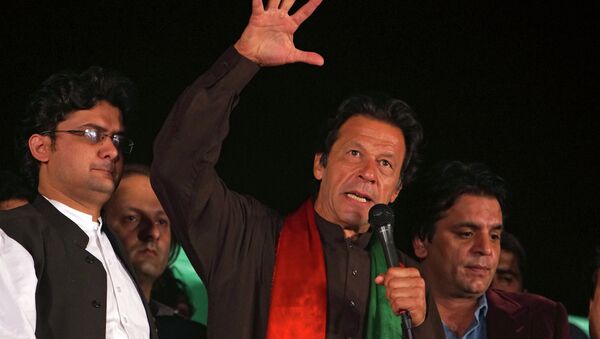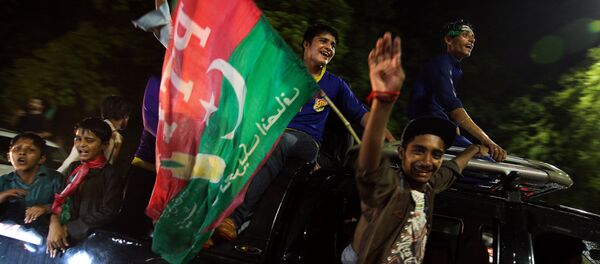Now he's set to be sworn in as the new Prime Minister of Pakistan. It's been quite a journey.
Imran faced a number of challenges in the cricket field, most of which he dealt with admirably. Taking over as captain of Pakistan during a turbulent time in the early 1980s, he led his country to new heights and had a profound impact on the development of the game. In 1992 he captained Pakistan to its first- and to date- only World Cup victory- inspiring his team with the immortal words: ‘We have nothing to lose. We should go out and fight like wounded tigers'.
"Imran's success is first and foremost a triumph of will and intelligence," Oborne writes. "Imran was the only captain in Pakistan's history, apart from Kardar and Mushtaq Mohammed, with the strength of character to stand up to the cricketing bureaucracy".
READ MORE: Imran Khan Could Be Ousted by Pakistanis If Fails to Keep Idealistic Promises
Imran has always been his own man — something that will stand him in good stead for his new role. Oborne cites his team-mate and former Pakistan captain Javed Miandad who says of Imran:
"He had complete confidence in his own physical abilities and mental skills, and it paid him great dividends".
Not the most naturally gifted cricketer in his youth, Imran basically taught himself to become world-class. He decided he wanted to be a Test cricketer when he was nine-years-old saw his cousin, Javed Burki, score a century against England in Lahore.
For the self-made cricketing legend, now read, self-made politician.
The great @ImranKhanPTI led his country to the top of the Cricket World in 1992. Now he has an opportunity to champion his country's cause with his leadership. The world awaits. He is a proven leader. He must be given his chance. #PakistanZindabad #CongratulationsSkipper
— Alan Wilkins (@alanwilkins22) July 27, 2018
He'll need to be flexible and pragmatic too — and build alliances within existing power structures. As Srinivasa Prasad points out in a recent First Post column, deals with the Army will probably have to be struck to enable Imran to carry out his domestic programme in return for the military maintaining control over foreign/security policy.
An even more serious threat to Imran's ability to deliver on his election pledges could come from the IMF. Reports are that Pakistan is preparing to seek up to $12bn in financial assistance.
That would come with plenty of strings attached, but there are other options which could help Pakistan remain solvent but not endanger planned welfare programmes. A stronger pivot towards China — and away from the US and the west, look in Pakistan's best financial interests.
Last week Imran‘s party, the PTI, tweeted in Mandarin about 'strengthening and improving ties' with China- and wanting to send poverty alleviation teams to China.
Right on cue, the US has warned against the IMF bailing out Pakistan's loans from China- which already amount to around $5bn.
If you read 'Wounded Tiger', (and I highly recommend it), you will be reminded of the way the US has consistently interfered in Pakistani affairs for many decades. For all its talk of 'spreading democracy,' Washington was a strong ally of the military regimes of Ayub and Yahya Khan. When the democratically elected socialist ZA Bhutto became a leader in the early 1970s, the US — in Oborne's words ‘with-held the hand of friendship', and slashed aid to Pakistan. After Bhutto was ousted by the military in 1977, (he was subsequently executed), the US again got very friendly. Pakistan, under the Terry-Thomas look-alike, General Zia, was used as a base for anti-Soviet, anti-government Mujahideen fighters in neighboring Afghanistan. We all know how that one turned out- and how Pakistan was adversely affected.
Iran Ambassador writes a letter to Chairman PTI @ImranKhanPTI, congratulating him on the victory in Elections.#Pakistan #Iran pic.twitter.com/GMHV9FVn38
— PTI (@PTIofficial) July 30, 2018
Imran has long been a staunch critic of US policies in the region. In 2012 he said that US drone strikes were 'butchery' and that they were 'fomenting radicalization'. He's called NATO a group of Western "liberals (who) are thirsty for blood". In 2003 he urged people to protest against the Iraq War, saying that the US wasn't concerned about democracy- only its own interests.
Will he change his tune, or modify his stance in office, to make sure Washington doesn't work for his overthrow?
In fact, you could say that the biggest obstacles Imran has to overcome are not internal, but external. How far would the US 'allow' Pakistan to go in its pivot towards China? Imran has called for a ‘mutually beneficial' relationship with the US- saying that up to now the relationship has been ‘one way‘.
He's also said he's ready for talks with India.
There are undoubtedly problems aplenty, but if anyone can solve them it's Imran — the sporting hero and proud patriot who really doesn't know the meaning of the word 'defeat'.
The views and opinions expressed by the contributor do not necessarily reflect those of Sputnik.
Follow Neil Clark @NeilClark66
Support his AntiStalker CrowdFund





